How Do I Firm Up My Dog's Stool?
Wondering how to firm up your dog’s stool? It can be concerning when your dog’s poop is excessively soft or runny. After all, digestive health is one of the cornerstones of well-being.
That said, soft stool is a common issue among our canine friends. And you can rest easy knowing that, with a little effort, you can correct this problem and renew your dog’s digestive health.
Read on, and we’ll explore why your pup’s movements may be too soft. We’ll also discuss the changes you can make to their diet that will help to remedy the situation in no time.

Canine Digestive Health
Digestion is extremely important for your dog’s well-being. Their digestive system is responsible for processing food, absorbing vitamins and nutrients, and disposing of waste matter.
The digestive tract of a dog is much shorter than that of a human. On average, a healthy dog will digest a meal in about one-third the time it would take for a human. Dogs also have a different profile of digestive enzymes in their stomachs and saliva, which is one of the reasons why they can digest foods that we can’t.
Bowel movements are one of the best indicators of digestive health. You want your dog’s stool to be solid and firm but not rock hard. Having soft movements every once in a blue moon is not a big deal. But when it happens continuously, it’s time to consider making some changes.
Why Does My Dog Have Soft Stools?
It’s important to note that there’s a difference between soft stools and diarrhea. Soft stools are still formed, and you are able to pick them up and dispose of them. Diarrhea is more liquid than solid and is impossible to pick up.
Diarrhea can often be caused by an infection or virus. If diarrhea persists for more than a few days, you should call your veterinarian. Soft stool, on the other hand, is usually the result of a diet lacking protein and fiber.
(Although it’s also possible that your dog’s stools are overly soft as a result of food intolerances, medications, or even stress.)
If left untreated, soft stool can potentially lead to health issues down the road. That’s why it’s essential to monitor your dog with extra care when you notice it. Has your pup gotten into something that she shouldn’t have? Did your dog’s stool consistency change when you switched to a new brand of dog food? Is your dog getting enough protein and fiber? Dogs with diarrhea are prone to dehydration. It is very important to replace the lost fluids and electrolytes by giving oral rehydration solutions (ORS). There are many over-the-counter ORS that you can mix with drinking water. If you don’t have access to these, you can make one at home by dissolving 8 teaspoons of sugar and a teaspoon of salt for every liter of water.
For acute causes of diarrhea, fasting for 12 to 24 hours may sometimes be enough to allow the gastrointestinal tract to settle. If you identified the probable cause of diarrhea (e.g. garbage consumption, food and medication intolerance), it is important to immediately remove access or stop giving it. You may introduce smaller amounts of food and observe if the bouts of diarrhea resolve. Dogs may also benefit from a bland diet that includes pureed pumpkin or bananas. Giving fiber is also helpful.
These are all important things to consider when determining why your dog is having soft stools.
Dog's Behavior with Soft Stool
It is important to watch your dog’s behavior if he starts to have soft stools. A dog with soft stool but is acting normally is not a cause for panic. This may be a simple case of food intolerance. Take note of the frequency of soft stools and initiate first aid remedies. A dog with soft stool for two days despite normal behavior needs a vet visit.
A dog with soft stool and is not acting normally may indicate a more serious problem. Fatigue and lethargy may manifest as sleepiness, walking slowly, reluctance to get up and play, and not wanting to go for a walk. Dogs in pain may be irritable and vocal. Other symptoms you could look out for are vomiting, lack of appetite and abdominal tension. All of these warrant a visit to the veterinarian immediately.
Dog Diarrhea: What Causes Loose Stool in Dogs?
Diarrhea is an abnormal bowel movement characterized by loose, watery stools three or more times a day. This is a potentially serious condition because it can lead to dehydration, sepsis and shock if not treated promptly. Common causes of diarrhea include garbage consumption, dietary indiscretions, fatty foods, food intolerance, weak immune system, medications affecting gut flora, infections, parasites, and stress.
The onset of diarrhea may be acute or chronic. In acute diarrhea, the abnormal bowel movement typically lasts one or two days and goes away on its own. However, chronic diarrhea is persistent and may last longer than two weeks.
Garbage consumption, dietary indiscretions, fatty foods, food intolerance and medication affecting gut flora are primary causes of acute diarrhea. In these cases, the diarrhea usually goes away on its own upon the removal of the offending substance from the system of the dog. For instance, stopping a suspected medication may immediately relieve a diarrheic dog.
On the other hand, a weak immune system, diseases, infections and parasites are the most common causes of chronic diarrhea. With weak immune systems, the affected dog is predisposed to infections and gastrointestinal dysbiosis. Dysbiosis is an imbalance in the bacterial population in the intestines leading to diarrhea. Very young and old dogs have weaker immune systems, thus, are more prone to diarrhea.
Infections and parasites are more serious causes of diarrhea in dogs. In most cases, a medical intervention by a veterinarian is needed to address both the issue and the diarrhea. Moreover, several other symptoms may also be seen in these diseases. There may be vomiting, lethargy and anemia, especially in the case of parasitism.
Stress is also a common cause of diarrhea in dogs. As a matter of fact, stress colitis is said to be one of the leading causes of large bowel diarrhea in all dogs. Eliminating the stressors of the affected dog is helpful in this situation.
Immediate Remedies for Dog Diarrhea?
Dogs with diarrhea are prone to dehydration. It is very important to replace the lost fluids and electrolytes by giving oral rehydration solutions (ORS). There are many over-the-counter ORS that you can mix with drinking water. If you don’t have access to these, you can make one at home by dissolving 8 teaspoons of sugar and a teaspoon of salt for every liter of water.
For acute causes of diarrhea, fasting for 12 to 24 hours may sometimes be enough to allow the gastrointestinal tract to settle. If you identified the probable cause of diarrhea (e.g. garbage consumption, food and medication intolerance), it is important to immediately remove access or stop giving it. You may introduce smaller amounts of food and observe if the bouts of diarrhea resolve. Dogs may also benefit from a bland diet that includes pureed pumpkin or bananas. Giving fiber is also helpful.
What Can I Give My Dog to Harden His Stool?
There are a number of ways to firm up your dog’s stool. There are some effective medications available if this proves to be a long-term problem. Metronidazole is a good stool hardener for dogs, as it helps to reduce inflammation in the intestines, supporting healthy digestion
There are also some fiber supplements, such as metamucil that can be beneficial. Just remember to always speak with your veterinarian before starting your dog on any new medications or supplements.
People commonly report treating runny stools and tummy aches with certain foods as well. You don’t have to immediately resort to medications. In fact, there are actually quite a few things you can do to support healthy digestion, which the following sections will discuss.
Over-the-counter medications for diarrhea include Bismuth subsalicylate (Pepto-Bismol® and Kaopectate®), Loperamide (Imodium®), Kaolin/Pectin (Kaopectolin®, Kao-Pec®, Kao-Pect®, Kao-Pront®, Kaogel®) and Activated Charcoal.
Top Tips for How to Firm Up Dog Poop
There are a lot of actions you can take to support your pup’s digestive system without having to see a veterinarian or give your dog pills. Here are the top 7 ways to firm up your dog’s poop.
1. High-Quality, High-Protein Diet
To have normal bowel movements, dogs need a balanced diet that contains a sufficient amount of digestible protein. A high-quality, meat-based diet is your best bet. If you can, opt for chicken or turkey rather than beef.
It’s also important to limit processed foods and preservatives to the best of your ability. Avoid products that contain corn and soy, and instead go for products containing white rice. Introduce some pumpkin into your dog’s diet to further aid their digestion.
And avoid those paté type of dog foods! Stick to more natural ingredients and make sure only to support companies that have transparent nutritional labels. It may sound obvious, but it’s vital to know exactly what is in the food products you are purchasing.
You don’t need to spend a fortune, but expect to pay a little bit more for higher quality ingredients.
2. Get Rid of Dairy
Dairy is one of the main causes of soft stool for dogs, so remove it from your pet’s diet. As much as they may love milk, dogs just can’t digest it very well. This one adjustment alone may solve all your issues.
If you have a young puppy who’s on a milk replacement product, you should switch to a lactose-free milk replacement product (such as Lactol) if they’re passing runny stools.
3. Feed Your Dog Less
This may sound counterintuitive, but feeding your dog less can be an extremely beneficial thing to do. Sometimes the digestive system needs a rest. Recall that dogs evolved in a “feast and famine” type of situation.
As a general rule of thumb, if you can’t feel your dog’s ribs, your dog is overweight.
So, consider going 24 hours without feeding your dog. Or for a few days you might try feeding your dog only one meal a day. Maybe you just cut back on treats and begin to feed your dog smaller portions at meal time.
It may sound unkind, but it can actually be one of the best things for your dog’s overall health. Giving the colon and digestive tract a break can be very healing.
4. Avoid Fatty Foods
Limiting fatty foods and sticking with blander, milder foods will also help to firm up your dog’s bowel movements. Cut back on fatty red meats and opt for more fish, chicken, and turkey.
Improvements may not happen overnight, so make sure to stick with this mild diet until you do notice some substantial benefits.
Keep in mind that any food fried in oil is tremendously difficult for doggies to digest. Feeding your dog fast-food or deep-fried foods is one of the worst things you can do in this situation.
That’s right, no more cheeseburgers!
5. Probiotics
Just like humans, dogs rely on a population of bacteria in their gut to digest their food. An imbalanced diet can support the growth of unhealthy bacteria in the gut, and this can lead to digestive issues and even diarrhea.
Probiotics introduce good bacteria into the gut, helping to correct the balance and aid healthy digestion. Please note that the digestive bacteria of dogs is not the same as that of humans. Giving dogs probiotics that were designed for humans can worsen diarrhea and loose stool.
So look for a probiotic that’s made specifically for dogs, such as fortiflora. And if you’re in doubt, call your veterinarian’s office. They will help guide you to the appropriate products and dosages.
6. Drink More Water
Your dog should have access to clean, fresh drinking water at all times. Being hydrated is crucial when it comes to healthy digestion. Diarrhea can also cause dehydration, so it’s really important to have fresh drinking water available 24/7.
Water also binds to fiber in the gut, helping to keep your dog regular and firm up their stool. Just remember to clean their water dish at least a few times a week so they aren’t drinking dirty water.
7. Add More Fiber
Naturally, adding fibrous foods is a great way to firm up your dog’s poop. Fiber absorbs extra liquid in the digestive tract, which helps to harden your dog’s stool. Fiber also helps your canine friend to feel more full, which can be helpful with reducing their meal size (see tip #3).
As we’ve previously mentioned, pumpkin is great for digestion and it contains lots of healthy fiber as well. White rice and oats are also good options. If you regularly feed your dog wet food, you might try switching to dry kibble (which tends to have more fiber).
Feel free to give your dog a little raw fruit or an uncooked carrot to add a little extra fiber. Avoid canned veggies though, since they usually have way too much sodium.
It can take the system a few days to adjust to a new fiber intake. For that reason, you should increase their fiber intake in incremental steps, over the course of a few days to a week.
If Diet Doesn’t Improve Dog’s Stool, Visit a Vet
If you’ve made these improvements to your dog’s diet and they’re still passing overly soft stools, call your vet and schedule an appointment. You’ll feel better knowing that there aren’t any underlying health problems.
Oh, and if you’re thinking of trying out a new dog food to help firm up your dog’s stool, you’ll want to check out our high-protein dog food. This all-natural, chicken-based formula is perfect for supporting digestion and all-around health. Your dog is sure to love it.
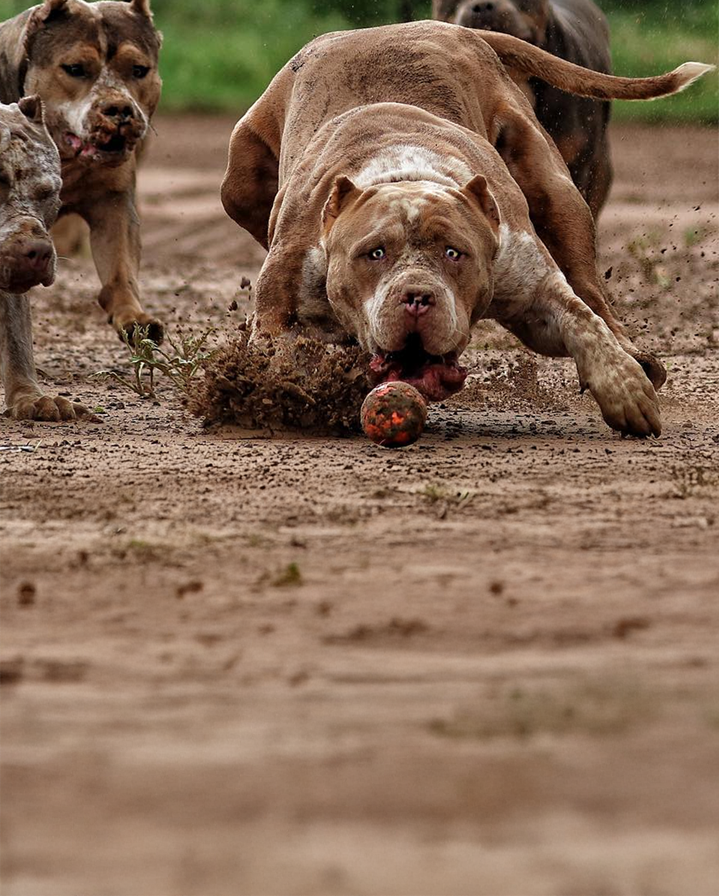
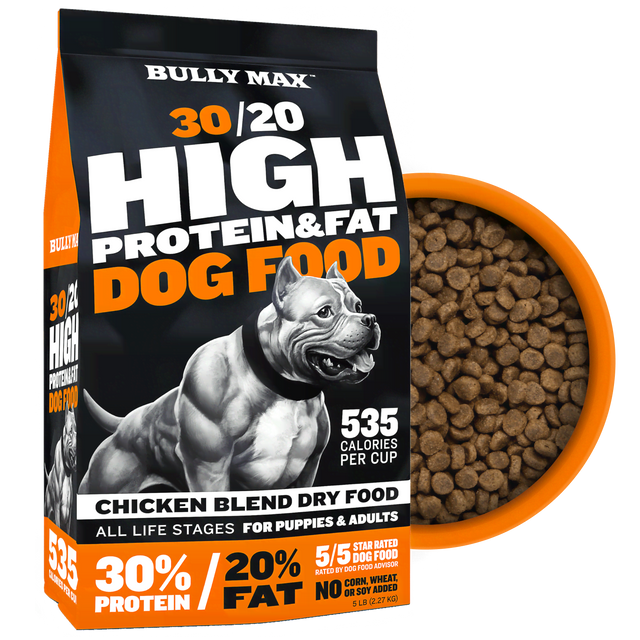
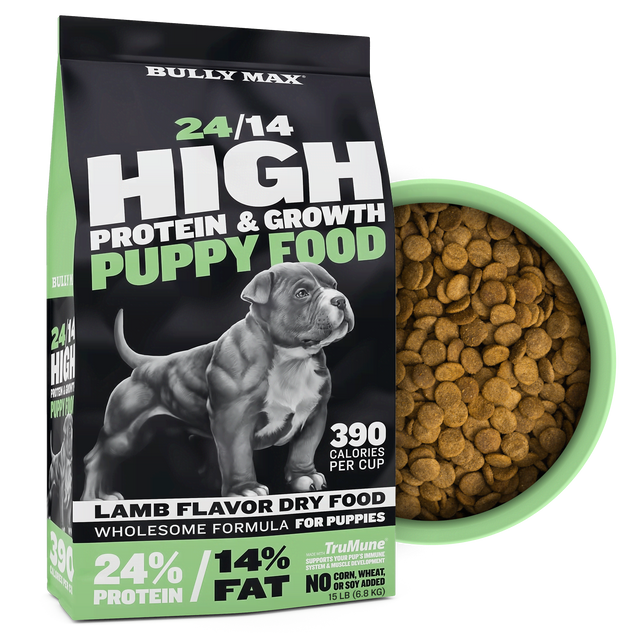
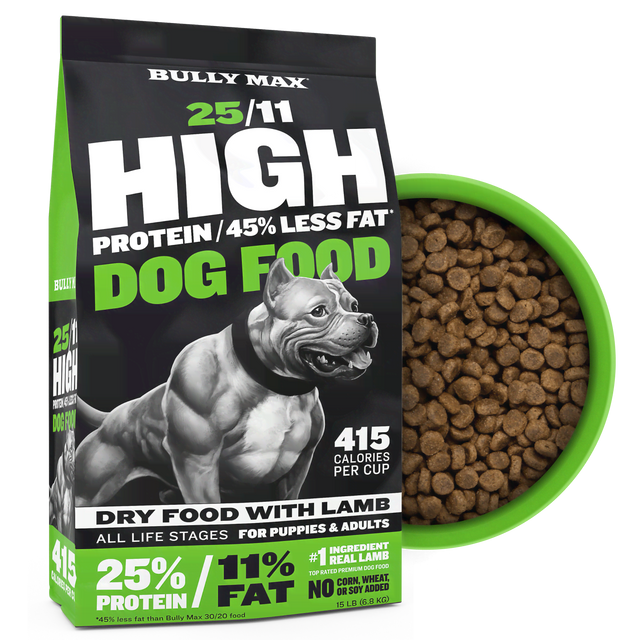
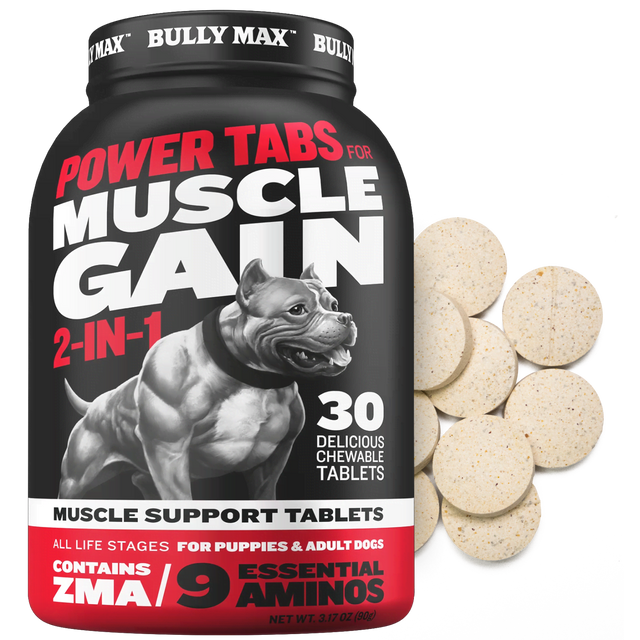




18 comments
Information very helpful, thanks
What about feeding my 6 month old Lab Pumpkin? What kind of pumpkin and how much he weighs 50 pounds.
Your blog is a great source of information and inspiration! I love how you present your topics in a clear and engaging way, making them easy to understand for people from all walks of life. Keep up the excellent work!